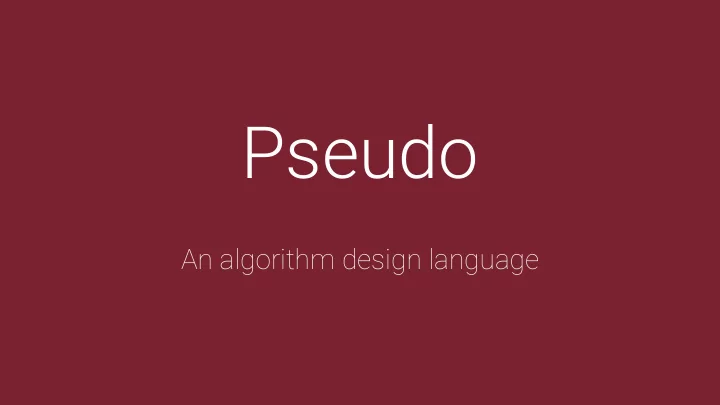

Pseudo An algorithm design language
Overview - Concise Pythonic syntax - Rich list support - Robust type inference - On-demand objects
Compiler Architecture Type Inference Modules L1 Inference Scanner Parser L2 Inference Codegen Preprocessor
Syntax
Syntax
Syntax
Lists - Variable-sized collections of data - Supports primitive types and objects - Backed by LLVM arrays - Rich built-in functions - get(), set(), length(), insert(), remove(), push(), pop(), enqueue(), dequeue()
Lists
Type Inference (L1) - Primitives: num,bool,string - Infer the types of variables based on their usage (Hindley-Milner) - Doubles as a semantic checker
Type Inference (L1)
Objects - Containers of arbitrary data - Backed by LLVM structs - Flexible and on-demand
Objects Users never explicitly define or create objects!
Object Inference (L2) - Novel object inference algorithm - We determine at compile-time: - Whether each variable is an object, and if so: - Its object type (an integer id) - The set of fields in the object type - The types of those fields
Object Inference Algorithm 1. Collect fields for each object variable 2. Collect equalities for object variables 3. Unify object variables to obtain object types 4. Annotate SAST with object type ids 5. Pass to codegen the object types
Object Inference Algorithm Coercive Object Equality Scheme - Two objects are of the same type if they are used in a manner that would require them to be the same type - Examples: assignment, in a list with other objects, arguments to a function
Object Inference Algorithm Coercive Object Equality Scheme
Object Initialization - The first field assignment determines the scope of an object - Other fields are automatically initialized to default values - init keyword can also be used to initialize objects in a scope
Object Printing - Our built-in print function also supports objects!
Key Accomplishments - Lists Types supported: num , bool , string , Object - - Rich built-in function support - Objects - Novel object inference algorithm Object field types supported: num , bool , string , - Object (1 level) , List - High Dimension Type Inference - (All primitives) × (Lists) × (Objects)
Demo
Pseudo An algorithm design language
Recommend
More recommend